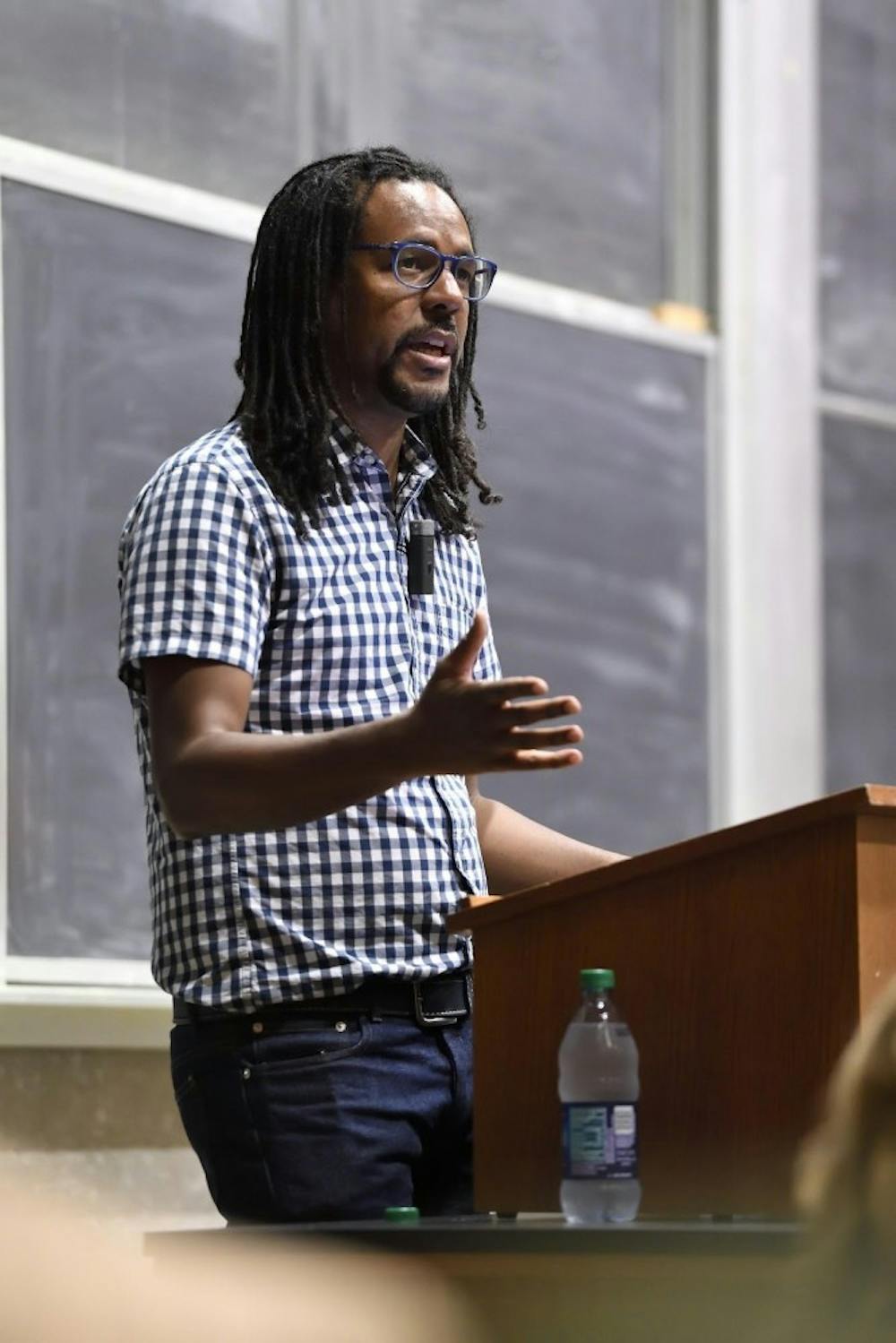At the first President’s Reading Series talk of the year, Assistant Professor in the Writing Seminars Danielle Evans acquainted the audience with Colson Whitehead’s accolades: Pulitzer Prize winner, National Book Award winner, MacArthur and Guggenheim Fellow, author of eight books of fiction and non-fiction. Reaching the podium, Whitehead introduced himself differently.
“I usually spend Tuesday nights in my apartment weeping over my regrets; so this is a change of pace for me,” he said.
The decorated author is a humble and hilarious speaker, and with just one sentence, he dispelled the expectation for a traditional, stuffy reading. He spoke candidly about his struggles as a child who was attracted to stories, hated going outside and wanted to write a black version of the movie The Shining.
He went on to talk about his time as a college student who “considered himself a writer but didn’t actually write anything” and how he got turned down from all the creative-writing classes at his school. It’s refreshing to see an artist of striking talent pulling the curtain back from his genius-like persona to reveal someone navigating constant trials, failures, human mistakes and all the comedy that comes with it.
Whitehead pulled out a tablet and played nearly a minute of Donna Summer’s “Mac Arthur Park Suite.” It’s the song, he said, that he dedicated to the publishing groups that rejected his first book about “a Gary Coleman-esque child star.” After this first rejection, Whitehead contemplated other careers but decided that the surgeon and lawyer life involved too much standing. In his words, you need to “sit on your ass and muse about crap DNA.” Whitehead accepted that he was to move forward and keep at the writing thing.
18 years ago, Whitehead started The Underground Railroad when he found that the phrase evoked the sense of a literal train beneath the earth. He decided this would be his premise: The train would move through the states, and each one would be a different land of American possibility. The book would move from metaphor to metaphor. It wasn’t until he’d written the first several books that he felt he could pull the concept off in a technical sense. The Underground Railroad went on to win the Pulitzer Prize and National Book Award.
The prose in The Underground Railroad is tender, the material heavy. It’s a slavery novel that, as Evans points out in her introductory statement, the New York Times calls, “something much more interesting than a historical novel.” When asked why he didn’t tell a realistic story of a slave running away, Whitehead said the book needed fantastic elements in order to engage in a conversation with history.
Whitehead described his motto while writing the book.
“I wouldn’t stick to facts, but I’d stick to the truth. The larger American truth that I can create by moving things around,” he said.
Whitehead also addressed why he made the protagonist a woman.
“I’m always trying to do different things from book to book. Figure out how to tell different stories,” he said.
He joked that this variety is driven by a voice that tells him, “Don’t do the same shit all the time, Colson. People will get sick of you.”
He admitted that it was difficult writing about a person unlike himself, but said that it’s always hard to write a character regardless of their proximity to you. He also chose a female protagonist because Incidents in the Life of a Slave Girl by Harriet Ann Jacobs was one of the slave narratives that heavily inspired him.
When asked whether he’s concerned with what’s real and what’s not in the book, he joked that he feels no responsibility to the reader.
“I’m thinking about the effect a sentence will have, whether some low comedy juxtaposed with something horrible in the next paragraph has an effect,” he said.
He also said that he had to commit to a book like this. He had to research to put the real world on the page and deal with the subject with the gravity it deserved.
“I felt some duty to testify for my ancestors,”
Whitehead said.
When asked if he feels a similar duty as a black writer to write on racial issues, Whitehead said he doesn’t necessarily feel this way. He’s written books about poker, a zombie apocalypse, a nomenclature consultant.
“Sometimes race is a component, and sometimes it’s not,” he said.
Responding to questions, the writer revealed he has two new books in the works: one about 1960s Harlem and the other about a topic he realized he had to cover — the Trump era. In recent tweets, Whitehead delved into the process.
“Handing in the new book July 4. Which means every day I get out of bed, make some coffee and put on the theme to ‘Smokey & The Bandit,’” he tweeted.
A new Colson Whitehead book seems to be just around the corner, and I can’t wait to pick up a copy.





